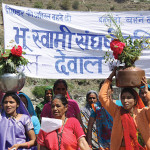The socialization process of an individual and particularly a girl involves a clear division of home and the world. Where the world outside is the spiteful and uncanny, while the home emits the safe energies of mirth and security. However picking up from this and taking cue from the sexual assaults and molestation a girl/woman faces happens to be experienced in the domestic sphere at the hands of not the unknown devils but the known demons feeding on them. As the bifurcation seems to be a redundant category to be utilized while analyzing an incident of sexual assault or rape, one is intrigued into investigating what this bifurcation leads to and how this proves to be a fatal impediment for the liberation of the oppressed women at large.
Last year Delhi Trial Court judgment on non-criminalizing rapes which happen within the contours of familial and conjugal space i.e marital rapes, created spurs not only in the minds of the general masses but has achieved its metal in extinguishing the fading spark of the women who live through it every day. Such hostile judgments are coming from all the corners of the world and affecting and making sure that the individuals lose the sense of security at ‘home’ and creeps in the way for ineffective and banal judicial system. By not taking in account the voices of the women, the patriarchal state is re-emphasizing its gendered point of location and its discourse centered on minimizing and controlling the right of women over their bodies.
The second wave of feminism during the 1960’s and 70’s started off with the slogan as ‘personal is political’ as it entails the societal attitude towards women and also the unit from which society derives its values and perceptions attached to the specific gender, which is family. India from the colonial times bifurcated the two spheres, which has often failed to do justice to its women folks even today. Because of this, we have produced a social system where social evils are termed/ manipulated and translated as personal matters/choices which curtails the analysis and decoding of the situations. The latest case of a girl of 12 year in Coimbatore, who was repeatedly raped by her father and three of his neighbors’ distorts the imagery of society and neighborhood in the mind of a young girl like her. It also shows the extent and form of sexual assault and using it as an instrument of blackmailing. As witnessed and documented, the assault is often known by the kith and kin of the family, but unaltered in order to maintain the gender hierarchy and keep on using the site of a woman’s body as an object of pleasure. An overarching idea of household often succumbs to these ordeals as the psyche is so deep rooted that women are for men, to an extent where they even have to offer their daughters.
The Hindu’s report says that “a third of all the cases heard during one year dealt with consenting couples whose parents had accused the boy of rape”. This as I see, was taken to be as a weapon against the feminist struggle, ignoring the real malady that the reason many of them are unreported is not because they don’t happen but because they take place within the private-political hierarchy of the domestic space. The idea of it, where women do not report brutality by their husbands is often linked to the histories of domestic violence and sexual abuse that render these women voiceless and self destroying statues. This also translates into the bigger idea of women security where women are not entitled to feel safe even within their households amongst their family members. This constant struggle to be safe with precautions and not invite a male gaze or attention, lands us into the trouble to choose longer routes on buses and trains in the public spaces. Through this we are made to feel uncertain of ourselves and the people of the society we strive in. This constant tussle is watered along from our tender ages, where we are reared to be subservient and serve to the very gender that is a threat to our bodily integrity.




Discuss this article on Facebook





